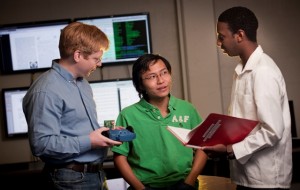
Matthew Taylor, assistant professor of computer science, Tong Pham ’13, and Kumera Bekele ’13
Artificial intelligence isn’t just for the movies anymore. Tong Pham ’13 (Anaheim, Calif.) and Kumera Bekele ’13 (Addis Ababa, Ethiopia) are working under the guidance of Matthew Taylor, assistant professor of computer science, on research aimed at allowing autonomous computer programs to coordinate among themselves.
Pham, an electrical and computer engineering major, talks excitedly about the possibilities.
“Imagine networks of rescue machines organizing themselves to work through the rubble of a building, relaying precious water and medicine to the trapped victims by themselves, digging into places too deep and too geometrically complex for humans to offer guidance,” he says. “Imagine having medical nanobots exploring your liver, cooperating in the complex and chaotic microscopic environment to deliver a multitude of drugs and carry out nano-scale construction of medical devices. These scenarios see autonomous agents maximizing the advantage of their strength and maneuverability by means of synergy, where cooperative work is necessary to accomplish a complex mission. This is just the beginning.”
The team’s project is a continuation of research Taylor has been doing over the last several years on distributed coordination of exploration and exploitation (DCEE). For this project, they are attempting to program autonomous agents – robots – to communicate with each other in order to solve a problem together. For example, they have created a scenario where a wireless network signal needs to be available across an area, but signals from a single broadcast source are diminished by blocking walls and terrains. Their solution is to let a team of robots, each capable of receiving and forwarding signals, roam the area.
“The DCEE framework is a novel problem formulation that combines research from the multi-agent community with the machine-learning community,” explains Taylor, who has published three papers on the topic and plans to submit this project to the 25th Conference on Artificial Intelligence in February. “In addition to being an academically interesting problem, our hope is that such algorithms (computer process procedures) will eventually be useful in real-world situations, both with robots and with virtual agents like computer programs.”
Pham and Bekele are implementing new algorithms and collecting and analyzing data on the algorithms. Taylor is pleased with his students’ work and hopes they continue the project in the summer. He points out that DCEE is a unique and rewarding research experience for undergraduates.
“It gives them a chance to work on problems where no one knows the ‘correct’ answer, or even if a ‘correct’ answer exists,” he says. “Instead, they must attack problems from multiple angles, using any tools at their disposal, and work with me to overcome any unanticipated roadblocks.”
Bekele is not new to research but says the world of artificial intelligence is certainly uncharted territory. He previously worked with Chun Wai Liew, associate professor and head of computer science, on two projects – one on data visualization and analysis software and one on computer modeling.
“Artificial intelligence is a new frontier for me, and Professor Taylor introduced and brought me up to speed on the project,” says Bekele, a double major in computer science and economics. “At Lafayette, there is so much opportunity to work with professors outside of class.”
For Pham, who also performed EXCEL research with Liew to use a genetic algorithm to study predator-prey interactions, computer science is the perfect blend of academic challenges and real-world applications.
“Computer science is an exciting field that is ripe with inventions on a weekly basis,” he says. “It’s a versatile field that allows you to branch out to almost anything modern societies have to offer, from the sciences to the humanities. And, it’s a field so young yet so full of insanely difficult puzzles that you can always try hacking away at.”
